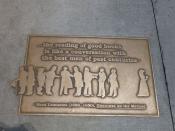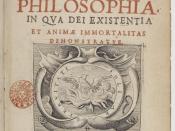The Sixth Meditation and Material Falsity In the Third Meditation, Descartes' meditator says that ideas are "as it were the images of things" (CSM II 25/AT VII 37). But just a few pages later, he says that material falsity "occurs in ideas, when they represent non-things as things" (CSM II 30/AT VII 43). How can an idea be of a thing, yet represent a non-thing? This problem has worried many of Descartes' readers, including his contemporary, Antoine Arnauld, who objected that Descartes' notion of material falsity was "inconsistent with the author's own principles" (CSM II 145/AT VII 206). My paper provides a new interpretation of Cartesian material falsity which has the added benefit of explaining certain difficulties with the Sixth Meditation proof for the existence of corporeal substance. I interpret material falsity by appealing to the distinction Descartes makes between two senses of "idea" in the Preface to the Meditations, where he says that "idea" can be taken either "materially" (as an operation of thought) or "objectively" (as the thing represented by that operation) (CSM II 7/AT VII 8).
I argue that for Descartes, a materially false idea contains objectively something quite different from what the idea actually presents to the thinker; the idea in the material sense does not "match" the idea in the objective sense.
My discussion begins with a brief reconstruction of the Sixth Meditation proof for the existence of corporeal nature. On the face of it, this passage does not seem to have anything to do with material falsity. Yet, as I shall show, for the proof to succeed requires a certain conception of sensation, and this conception suggests a clear way in which an idea can be materially false. While the Sixth Meditation proof might not initially seem to present any special difficulties, this...


